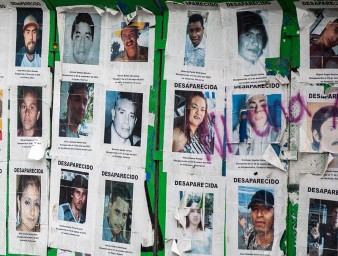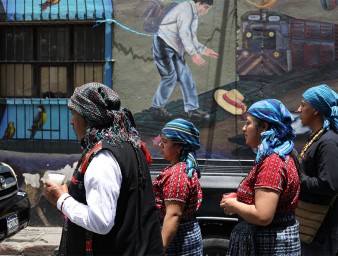Trans rights are “not subject to referendum.”
24 December 2019

The evening of Sunday, 4 August 2019, saw Karina Pankievich breathing a sigh of relief. Tolerance had won.
A conservative faction of the Uruguay Parliament initiated a ballot box referendum in an effort to place the repeal of the 2018 “Trans Law”, which guarantees the rights of transgender people. A turnout of 25 percent of eligible voters was needed to place the recall of the law to a national vote. Less than 10 percent of eligible voters turned out on that Sunday.
For Pankievich, who is president of the Trans Association of Uruguay (ATRU), the news helped to keep in place one of the greatest achievements of her activism, she said. It also reminded her once again, of the support that she and other activists had from other NGOs, the community and the United Nations.
“Our achievements are achieved, and we will fight for them,” Pankievich said. “These rights are not subject to referendum.”
For Mireia Villar-Forner, UN Resident Coordinator in Uruguay, the rejection of the repeal was a victory. The UN Office in Uruguay had worked closely with the UN Human Rights Office of South America on the legal ramifications of the appeal, and publicly expressed its concern in the local press.
“We were interested in ensuring that this law, which had been achieved with such great effort, was valued,” she said. “It is a law that seeks equity and equality for all citizens in Uruguay and it seemed important to us. . .to inform others of the importance of not going backwards.”
30 years an activist
Pankievich moved to Montevideo at 13 years old, but by the time she was 15, she was a sex worker during the years of dictatorship in Uruguay. The violence – both mental and physical -- and suppression she faced led her to leave Uruguay for many years, moving between Brazil and Argentina.
Yet Pankievich knew she needed to come back home, to let go of the hurt and the pain, if she was going to make a difference in her life and others.
“After a while, I realized holding a grudge was going to hurt me,” she said. “I remember all the things that happened, but I try as much as possible to leave them in the past, because I think resentment doesn’t take you anywhere.”
She returned in 1985, and found that others in the LGBTI community were keen to champion their human rights, but were afraid. Pankievich worked with the others in the trans community and helped to found the ATRU that same year, focusing on training, supporting and mobilizing activists to promote and stand up for their rights. Today, ATRU is a network of trans rights groups across the country and reaching out to other countries in South America.
One of the group’s biggest successes has been the Diversity March, which celebrates the country’s LGBTI community. When the march first began in 1992, Pankievich noted “we were only three or four frightened activists with our faces covered.” This year’s march in September saw 130,000 people celebrating and walking through the streets of Montevideo, chanting “love is love.”
All are equal
More improvements particularly for Uruguay’s transgender population, continued. In 2016 the country conducted its first trans-person census, and recognized some 900 self-identified trans people in the country. The census also noted the startling fact that while the life expectancy of the country is 77 years old, for the trans populations it was 35.
In 2018, the trans community in Uruguay received and even bigger boost – a law that guaranteed their rights. The “Trans Law” grants transgender people the right to get an operation that matches their sexual identity, which would be paid by the State along with hormone treatments. The law also ensures a minimum number of transgender people are given public jobs over the next 15 years.
UN Human Rights Advisor Graciela Dede, who works at the resident coordinator’s office in Uruguay, said it was essential find the best way to support the LGBTI community to access remedy and reparations in terms of human rights. To do this, it has been good to work with activists like Pankievich.
“For us it is essential to have an analysis of the rights in this particular group, which is a collective…not homogenous…that it is different and diverse,” she said.
For her continued work on behalf of the LGBTI community in Uruguay, Pankievich was recognized this December as a Distinguished Citizen of Montevideo, the first trans person to receive such an honor. The distinction recognizes her continuing work on behalf of the community and her contribution in helping all citizen see the beauty in diversity.
“We are all beings of this universe,” Pankievich said. “The only thing we have to start is to get to know each other and know how to live together, respect each other…and for me I work on this all year and day to day.”
24 December 2019




